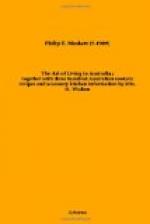In the earlier part of this section I have attempted to form a provisional classification of people as far as the effect of tobacco is concerned. Firstly, those upon whom tobacco in any shape or form is an absolute poison; secondly, those who can enjoy a very small amount-daily; and thirdly, those who are able to smoke in moderation. Now, while those who use tobacco with wise discretion appear to be none the worse for it, yet it unfortunately happens that far too frequently there is no limit to this discretion. It is too often the case, therefore, that quite a serious amount of damage to health results from excessive smoking. It requires a good deal of judgment, and even more resolution, to use and not abuse tobacco.
There are certain symptoms which should lead a man either to curtail his allowance, or else give up tobacco altogether. These are marked nervousness, trembling of the whole body, unsteadiness of the hands, and twitching of different muscles. There may be also swimming of the head, severe headache, and a feeling of despondency. In other cases there may be irritability of temper, a want of will determination, and progressive loss of memory. The special senses—sight, hearing, taste, smell, and touch—may all be blunted. The Bight and hearing are often markedly affected. Colour blindness is sometimes a result, and there may be that impairment of vision known tobacco amblyopia. As regards the hearing, too, there is not unfrequently a drumming in the ears and confusion of sounds.
And more than this, tobacco, when unsuitable or used in excess, has other prejudicial effects. Its action on the heart is well known, and is frequently manifested by violent palpitation and by disturbed action of the heart. There is also a definite disorder known as “the smoker’s heart.” In this affection the beats, instead of being regular, are very rapid, suddenly becoming very slow. In this way the rhythm of the heart has been aptly compared by Dr. Lauder Brunton to a restive horse, who goes into a gallop for a few yards, next pulls up all at once, and then breaks off into a gallop again. When tobacco has these prejudicial effects upon the heart, it is no good diminishing the allowance. The only way to bring about any good result is to knock it off altogether.
In addition to its direct action on the heart, tobacco smoking may also bring on a sudden fainting, in which there is absolutely no warning. This condition may develop from the tobacco alone, but in many instances nervous excitement or shock are superadded. Professor Fraser, of Edinburgh, has observed that quite a number of his college friends, who smoked to an inordinate extent as students, were obliged to give up tobacco as middle age approached. Several of them had to do so on account of the onset of these sudden fainting fits. Many smokers also suffer from what is termed chronic pharyngitis. In this affection the mucous membrane at the back part of the mouth looks like dirty-red velvet, and there is also a constant hawking of phlegm. And further, indigestion itself is in many eases entirely due to excessive smoking, from which there is no relief except by abandoning the habit altogether.




